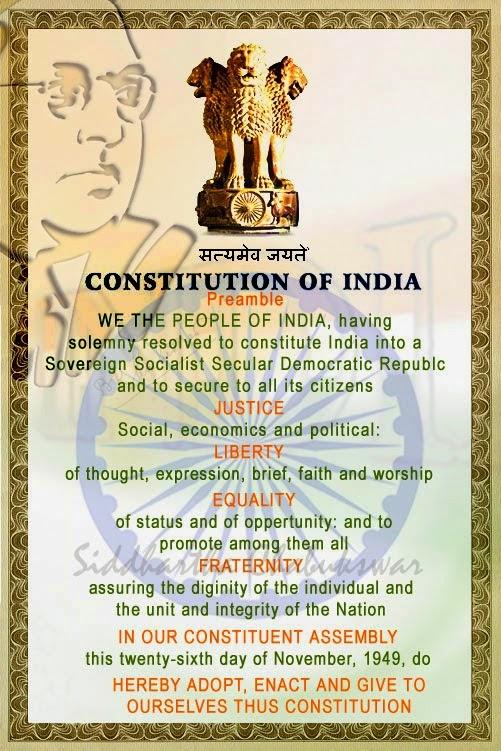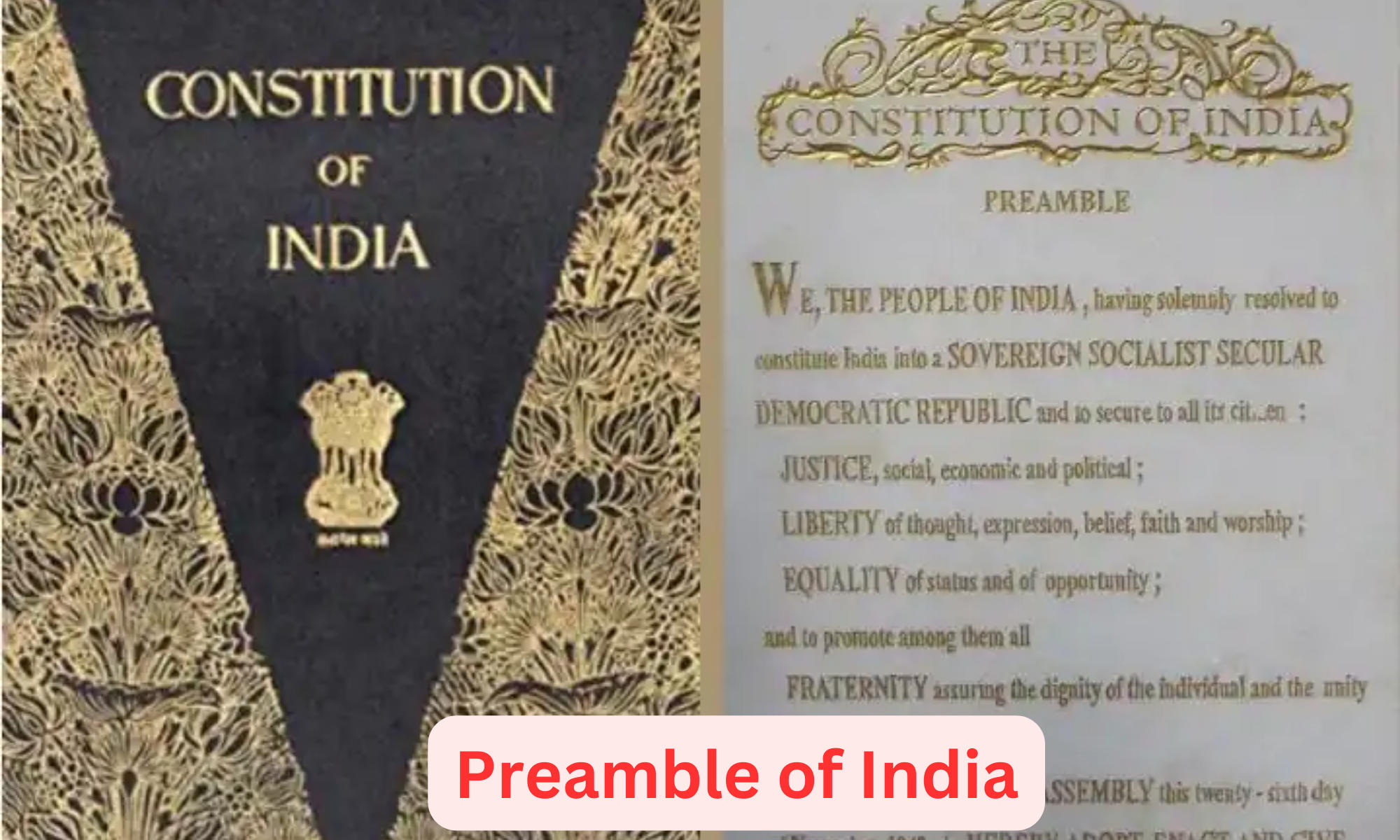Table of Contents
Preamble of India
The Preamble of India is a concise introductory statement to the Constitution of India, which outlines the fundamental principles, values, and objectives of the Constitution. It is considered to be the soul of the Constitution, as it reflects the aspirations and the vision of the founding fathers of the Indian Constitution.
Drafting of Preamble of India
The Preamble was drafted by the Constituent Assembly of India, which was formed in 1946 to draft the Constitution of India. The drafting committee was chaired by Dr. B.R. Ambedkar, who is widely regarded as the architect of the Indian Constitution. The Preamble was adopted on 26th November 1949, along with the Constitution.
Description of Preamble of India
The Preamble of India begins with the words, “We, the people of India.” These words are significant, as they emphasize the fact that the Constitution is created by the people of India and for the people of India. The Preamble goes on to state that India is a sovereign, socialist, secular, democratic, and republic country. Let’s understand what each of these terms means:
Sovereign:
India is a sovereign country, which means that it is free from external control and has the power to govern itself. India is not a colony of any other country and has its own government, laws, and Constitution.
Socialist:
India is a socialist country, which means that the government is responsible for the welfare of the people. The government is expected to work towards reducing economic and social inequalities and promoting social justice.
Secular:
India is a secular country, which means that the government does not promote or support any particular religion. It provides equal treatment to all religions and allows people to practice their religion freely.
Democratic:
India is a democratic country, which means that the people have the power to elect their representatives and participate in the decision-making process. India follows the principle of “one person, one vote,” and the government is accountable to the people.
Republic:
India is a republic country, which means that the head of state is elected by the people. The President of India is the head of state, and the Prime Minister is the head of government.
Justice, Liberty, and Equality
The Preamble of India also states that the Constitution aims to secure justice, liberty, and equality for all citizens of India. These three words hold great significance, as they form the cornerstone of the Indian Constitution. Justice means that every citizen of India should be treated fairly and without bias. Liberty means that every citizen should have the freedom to express themselves, practice their religion, and move freely within the country. Equality means that every citizen should have equal opportunities and rights, regardless of their religion, caste, gender, or social status.
The Preamble of India is a powerful statement that reflects the values and principles of the Indian Constitution. It provides a framework for the government to work towards the betterment of the people of India. The Preamble reminds us of the vision of the founding fathers of the Constitution and inspires us to strive towards creating a just, equal, and prosperous society.

Preamble of India: Amendment
The Preamble of the Indian Constitution is a concise introductory statement that outlines the fundamental principles, objectives, and ideals that the Indian Constitution seeks to achieve. It serves as the guiding light for the interpretation and implementation of the Constitution’s provisions. The Preamble has been amended only once in the history of independent India.
The original Preamble, which was adopted on 26th November 1949, declared India to be a sovereign, democratic, and socialist republic. It also mentioned justice, liberty, equality, and fraternity as the guiding principles for the nation. However, in 1976, during the Emergency period, the Preamble was amended through the 42nd Amendment Act.
The 42nd Amendment Act was brought into force by the then Prime Minister, Indira Gandhi, to make significant changes to the Constitution. The Amendment aimed to strengthen the central government’s power and limit the judiciary’s power to question its actions during an emergency. It also sought to redefine the nature of Indian democracy and add new features to the Preamble.
Addition of New Words in 1976
The Preamble’s amendment in 1976 added the words “socialist,” “secular,” and “integrity” to the original text. The amended Preamble reads, “We, the people of India, having solemnly resolved to constitute India into a socialist, secular, democratic republic and to secure to all its citizens: Justice, social, economic, and political; Liberty of thought, expression, belief, faith, and worship; Equality of status and opportunity, and to promote among them all; Fraternity assuring the dignity of the individual and the unity and integrity of the Nation.”
Socialist
The inclusion of the word “socialist” aimed to establish a welfare state in India, where the government takes responsibility for providing basic amenities and services to all its citizens. It sought to promote social and economic justice and eliminate poverty, inequality, and exploitation.
Secular
The inclusion of the word “secular” aimed to ensure that the government treats all religions equally and does not promote any particular religion. India is a diverse nation with multiple religions, and secularism ensures that no particular religion is given preference over others.
Integrity
The addition of the word “integrity” aimed to ensure that India remains united and indivisible. The Preamble’s original text did not explicitly mention the unity and integrity of the nation, but the 42nd Amendment Act added it to emphasize the importance of national unity.
- The amendment to the Preamble of the Indian Constitution through the 42nd Amendment Act aimed to redefine the nature of Indian democracy and strengthen the central government’s power.
- The addition of the words “socialist,” “secular,” and “integrity” aimed to establish a welfare state, promote religious harmony, and ensure national unity.
- The Preamble serves as a powerful reminder of the nation’s fundamental principles and ideals and continues to guide the interpretation and implementation of the Constitution’s provisions.
Preamble of India: Integral Part of Indian Constitution
Initially, in the Berubari case presidential reference, the Supreme Court of India stated that the preamble was not a crucial component of the Indian Constitution and, as a result, it could not be enforced in a court of law. However, in the Kesavananda case of 1973, the same court reversed its previous rulings and acknowledged that the preamble could be employed to explain uncertain areas of the constitution where there were different interpretations. In the Union Government vs LIC of India case of 1995, the Supreme Court reaffirmed that the Preamble was indeed an essential component of the Constitution.
Article 142: Pros and Cons of Article 142 of the Indian Constitution
Basic Structure Doctrine of The Indian Constitution Explanation And Significance
Indian Constitution, Salient Features, Preamble, Schedules & Other Details
Fundamental Rights of Indian Constitution | A to Z Details for UPSC



 TSPSC Group 1 Question Paper 2024, Downl...
TSPSC Group 1 Question Paper 2024, Downl...
 TSPSC Group 1 Answer key 2024 Out, Downl...
TSPSC Group 1 Answer key 2024 Out, Downl...
 UPSC Prelims 2024 Question Paper, Downlo...
UPSC Prelims 2024 Question Paper, Downlo...
